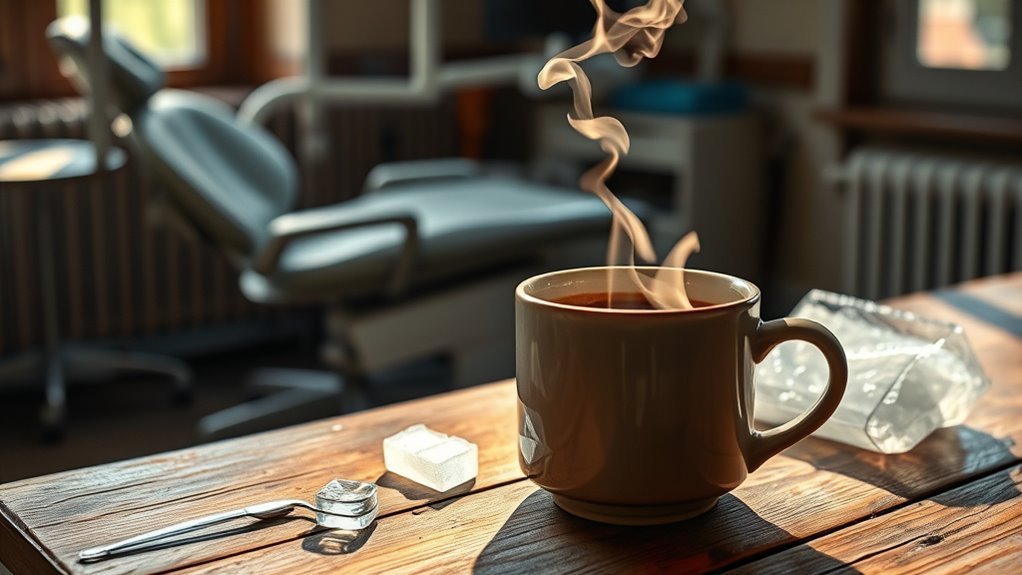When Can I Drink Hot Coffee After Wisdom Teeth Removal
After wisdom teeth removal, you should wait at least 72 hours before drinking hot coffee. Hot beverages can irritate your healing gums and disrupt the recovery process. During the initial recovery phase, stick to lukewarm drinks and consider alternatives like herbal teas or smoothies. Once you notice reduced swelling and discomfort, you may slowly reintroduce coffee. It’s important to prioritize comfort and health while you satisfy your caffeine cravings and learn more about safe consumption practices.
Understanding the Recovery Process After Wisdom Teeth Removal

After you’ve had your wisdom teeth removed, understanding the recovery process is essential for a smooth healing experience. Proper post-operative nutrition is vital; focus on soft, nutrient-rich foods like yogurt, smoothies, and applesauce to promote healing without aggravating your wounds. Stay hydrated, but avoid hot beverages initially, as they can increase discomfort.
In terms of pain management techniques, over-the-counter medications may suffice, but your dentist might prescribe stronger options if needed. Ice packs can help reduce swelling and numb pain in the first 48 hours. It’s important to listen to your body; if pain persists or worsens, don’t hesitate to reach out to your dentist for advice. Prioritize your recovery to regain your freedom and return to normal activities.
The Importance of Following Post-Operative Guidelines
Following post-operative guidelines is essential for a smooth recovery after wisdom teeth removal. Adhering to these instructions helps prevent complications like dry sockets, manage pain effectively, and guarantees proper healing. Your attention to these details can greatly impact your overall recovery experience.
Preventing Dry Sockets
While it might be tempting to enjoy your favorite hot beverage shortly after surgery, adhering to post-operative guidelines is essential for preventing dry sockets. This painful condition can occur if the blood clot dislodges from the extraction site, leading to severe discomfort. Here are some vital steps for dry socket prevention:
- Avoid using straws to prevent suction that can dislodge the clot.
- Stick to soft foods and avoid crunchy or hard items that could disturb the area.
- Refrain from smoking, as it can impair healing and increase socket complications.
- Keep your head elevated to reduce blood flow to the extraction site, aiding in proper clot formation.
Following these guidelines not only supports healing but also contributes to effective pain management.
Managing Pain Effectively
Although managing pain effectively after wisdom teeth removal is essential for a smooth recovery, it’s important to adhere to post-operative guidelines to guarantee the best healing. Following your dentist’s instructions on medication dosage and timing is key for ideal pain management. Over-the-counter pain relievers, like ibuprofen or acetaminophen, are often effective techniques that you can use but remember to consult your dentist before taking anything. Applying ice packs can also help reduce discomfort and swelling. Staying hydrated and eating soft foods will further support your recovery. By embracing these strategies, you’ll not only alleviate pain but also foster an environment for healing, allowing you to regain your freedom sooner and return to your normal activities.
Ensuring Proper Healing
Pain management is just one aspect of a successful recovery after wisdom teeth removal; ensuring proper healing is equally important. Following post-operative guidelines can greatly influence your healing timeline and overall recovery experience. Here are some essential tips:
- Stick to recommended dietary adjustments, prioritizing soft foods.
- Avoid using straws, as suction can disrupt blood clots.
- Stay hydrated, but avoid hot beverages for the first few days.
- Follow your dentist’s instructions regarding medication and follow-up appointments.
Why Hot Beverages May Not Be Ideal Initially
After having your wisdom teeth removed, it’s essential to reflect on the temperature of the beverages you consume, as hot drinks can pose risks during your recovery. Hot beverages can exacerbate oral sensitivity, making your healing process uncomfortable. The heat can irritate your extraction sites, increasing the likelihood of inflammation or complications. Additionally, a hot beverage may inadvertently burn your mouth, which is particularly concerning when your oral tissues are already sensitive. This discomfort can lead to a longer recovery time and hinder your ability to enjoy food and drink. As a result, it’s wise to avoid hot drinks initially, ensuring you prioritize your healing and comfort as you recover from the procedure.
Timing: When Can You Safely Resume Drinking Coffee?

When can you safely resume drinking coffee after wisdom teeth removal? Generally, it’s best to wait at least 72 hours post-surgery before introducing coffee back into your routine. This allows for initial healing and minimizes complications. Depending on your recovery timeline, you may also consider coffee alternatives during this period.
- Stick to lukewarm beverages to avoid irritation.
- Herbal teas or decaffeinated options can provide comfort without the risks.
- Monitor your body’s response to caffeine after resuming.
- Consult your dentist for personalized advice based on your healing progress.
The Impact of Temperature on Healing
The temperature of what you consume can greatly affect your healing process after wisdom teeth removal. Hot beverages may increase blood flow to the surgical site, potentially impacting recovery. It’s important to understand how temperature influences your body’s response during this critical time.
Healing Process Considerations
While it’s tempting to sip on your favorite hot beverage post-surgery, understanding how temperature can affect the healing process is vital. Hot drinks can irritate your surgical site and delay your healing timeline. Here are some recovery tips to keep in mind:
- Avoid extreme temperatures: Both hot and cold can disrupt the healing tissues.
- Opt for lukewarm beverages: This helps minimize discomfort while still allowing you to enjoy a drink.
- Monitor your pain levels: If hot drinks cause increased pain, it’s best to wait until you’re more comfortable.
- Stay hydrated: Proper hydration is essential for a smooth recovery, so prioritize fluids at a safe temperature.
Temperature and Blood Flow
Understanding the relationship between temperature and blood flow is key to your recovery after wisdom teeth removal. When you consume hot beverages, the increased temperature can affect blood circulation in your mouth. Elevated temperatures may lead to swelling and discomfort, particularly in sensitive areas where your gums are healing.
Your body’s temperature sensitivity plays an important role in how well you heal. Staying mindful of what you eat and drink helps maintain ideal blood circulation, which is essential for recovery. It’s best to avoid hot coffee for at least 72 hours post-surgery to prevent complications. By managing temperature exposure, you can support your healing process and reduce the risk of prolonged discomfort. Prioritize your comfort, and let your body heal effectively.
Alternatives to Coffee During the Initial Recovery Phase

Since your body needs time to heal after wisdom teeth removal, it’s essential to contemplate alternatives to coffee during the initial recovery phase. While you may miss your morning brew, several coffee alternatives can help you stay comfortable and refreshed.
Consider coffee alternatives like soothing teas, decaf drinks, and smoothies to aid your recovery after wisdom teeth removal.
- Soothing teas: Herbal options like chamomile or peppermint can be calming and hydrating.
- Decaffeinated beverages: Consider decaf coffee or tea to enjoy the flavor without the caffeine.
- Warm broths: Nutrient-rich and easy to consume, broths can provide comfort and nourishment.
- Smoothies: Blend soft fruits with yogurt or milk for a delicious, nutrient-packed drink.
These alternatives can help satisfy your cravings while supporting your healing process.
Signs That Indicate You’re Ready for Hot Coffee
After giving your body time to heal with comforting alternatives, you might start craving your favorite hot coffee again. It’s essential to recognize the signs indicating you’re ready to indulge in that warm cup. First, check for the absence of swelling and pain; these recovery milestones suggest your mouth is healing well. You should also notice a decrease in discomfort when eating soft foods, signaling that your jaw is adjusting. If you can comfortably manage mild temperatures in other foods and drinks without any sensitivity, it’s a good sign. Finally, listen to your body; if your coffee cravings are becoming hard to resist while feeling no adverse effects, it may be time to enjoy that hot coffee again.
Tips for Enjoying Coffee Safely After Recovery

How can you enjoy your favorite hot coffee while guaranteeing a smooth recovery? Start by being mindful of your dental healing process. Here are some tips to help you satisfy those caffeine cravings safely:
Enjoying hot coffee during recovery requires mindfulness of your dental healing—prioritize your comfort and health as you satisfy those cravings.
- Wait for Full Recovery: Guarantee you’ve fully healed before indulging in hot coffee.
- Choose Coffee Alternatives: If you’re still sensitive, consider herbal teas or decaf options that provide warmth without irritation.
- Sip Slowly: Take your time enjoying your coffee to avoid discomfort and allow your body to adjust.
- Stay Hydrated: Drink plenty of water alongside your coffee to maintain hydration during recovery.
How to Maintain Oral Hygiene While Enjoying Coffee
While you’re enjoying your favorite hot coffee, it’s essential to maintain proper oral hygiene to support your healing process. Start by choosing coffee alternatives, like herbal teas, if you’re still in the initial recovery phase. When drinking coffee, use a straw to minimize contact with your healing gums. Afterward, rinse your mouth gently with warm salt water to help reduce swelling and promote healing. Avoid brushing near the extraction site for the first few days; focus on other areas instead. Remember to keep up with your daily oral care routine by brushing and flossing gently. Proper oral hygiene not only enhances your coffee experience but also aids in a smoother recovery process.
Frequently Asked Questions
Can I Drink Iced Coffee Instead of Hot Coffee After Surgery?
Sure, you can sip on iced coffee instead of hot coffee post-surgery, but let’s not pretend it’s the same, right? Iced coffee’s benefits include hydration and a revitalizing kick, making it a decent caffeine alternative. Just remember, moderation’s key. Your healing mouth might not appreciate extreme temperatures, even if it’s iced. So, while you enjoy that cool brew, keep an eye on how you’re feeling! Your recovery’s the priority here.
What if I Accidentally Drink Hot Coffee Too Soon?
If you accidentally drink hot coffee too soon, it could lead to increased pain and discomfort. Your recovery timeline is essential; hot beverages may irritate the surgical sites, potentially delaying healing. For effective pain management, stick to lukewarm or cold liquids initially. If you experience significant discomfort, contact your dentist for guidance. Prioritizing your recovery will help guarantee a smoother healing process, allowing you to enjoy your favorite drinks sooner.
Are There Specific Coffee Types to Avoid After Surgery?
After surgery, it’s wise to avoid highly acidic coffee types, like certain dark roasts or espresso, as they can irritate your healing gums. If you’re sensitive to caffeine, you might want to limit your intake, since it can heighten discomfort or anxiety during recovery. Opt for low-acid blends or decaffeinated options to help minimize potential issues while still enjoying your coffee experience as you heal. Always listen to your body and adjust accordingly.
Will Coffee Affect My Pain Medication After Surgery?
Did you know that about 20% of adults experience caffeine sensitivity effects? After surgery, coffee can interfere with pain relief interactions involving your medications. Caffeine may amplify side effects or reduce the effectiveness of painkillers, potentially leading to discomfort. It’s best to consult your healthcare provider before consuming coffee post-surgery, ensuring you maintain ideal pain management while enjoying your recovery period. Prioritizing your health and comfort is essential during this time.
How Can I Flavor My Coffee Without Using Dairy or Sugar?
If you’re looking to flavor your coffee without dairy or sugar, there are plenty of great dairy alternatives and flavoring options. Consider using almond milk, coconut milk, or oat milk for a creamy texture. For added flavor, try cinnamon, vanilla extract, or cocoa powder. You might also explore plant-based creamers or even flavored syrups made from natural ingredients. These options can elevate your coffee experience while keeping it healthy and delicious.






